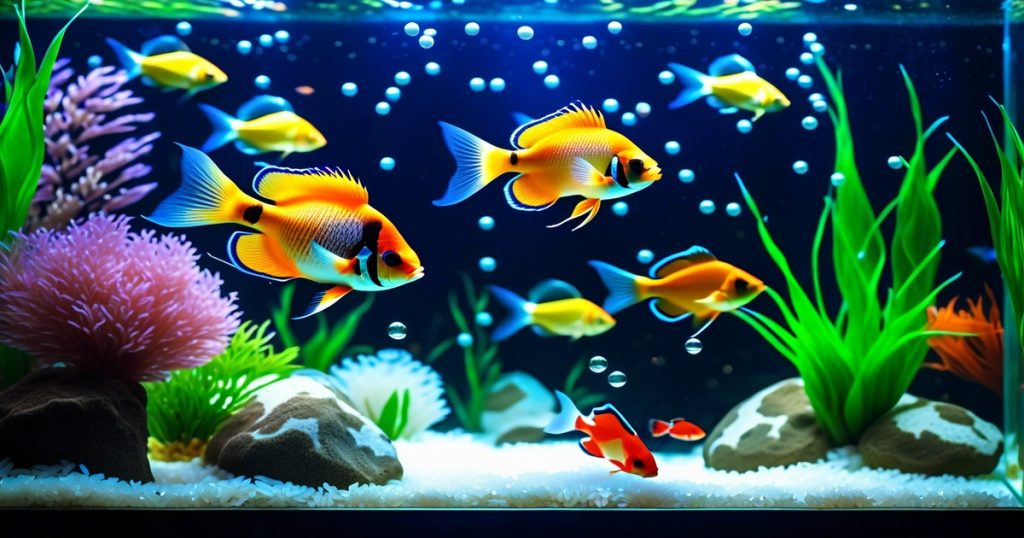Curious about whether fish can eat rice? You’re not alone. This age-old question has sparked many debates among fish enthusiasts and experts alike. In this post, we’ll dive into the topic to uncover the truth about feeding rice to our aquatic friends. We’ll explore the potential benefits and risks associated with incorporating rice, starch into a fish’s diet, as well as provide practical tips for those considering this unconventional food option for their underwater companions.
Table of Contents
ToggleUnderstanding Fish Dietary Requirements

Varying Dietary Needs
Different fish species have varying dietary needs. Some fish are omnivores, while others are carnivores or herbivores. It’s essential to understand the specific dietary requirements of the pond fish you’re keeping.
For example, small fish like guppies and tetras are omnivorous, meaning they require a diet that includes both plant and animal matter. On the other hand, predatory fish such as bass or trout need a diet rich in meat-based foods to thrive.
Importance of Proper Nutrition
Proper nutrition is crucial for the health and growth of pond fish. A balanced diet supports their overall well-being by providing essential nutrients such as protein, vitamins, fats, and carbohydrates.
Without adequate nutrition, pond fish may experience digestive issues and other health problems. For instance, feeding carnivorous fish only starchy foods like rice or potatoes can lead to digestive problems due to their inability to efficiently digest these substances.
Nutritional Content of Rice for Fish
Carbohydrates, Proteins, and Vitamins
Rice is a source of carbohydrates, proteins, fish fry, and some vitamins and minerals. These nutrients are essential for the growth and development of fish. For example, carbohydrates provide energy, proteins support muscle growth, while vitamins and minerals contribute to overall health.
Fish fry (young fish) require a diet rich in protein for rapid growth. Incorporating rice into their diet can help meet their protein needs. The carbohydrates in rice serve as an energy source vital for the active lifestyle of fish.
Variability Based on Processing and Type
The nutritional value of rice can vary based on processing methods such as polishing or parboiling, as well as the type of rice – white or brown. While white rice has undergone milling that removes the outer bran layer containing some nutrients, brown rice retains more nutritional content due to minimal processing.
When considering fish diets, it’s important to choose a suitable type of rice that aligns with the specific nutritional needs of the fish species being raised. For instance, if a particular species requires higher levels of certain vitamins or minerals found in unpolished grains like brown rice, then incorporating this variety into their diet may be beneficial.
Risks Associated with Feeding Rice to Fish
Digestive Health
Feeding rice to fish can lead to digestive issues if not done in moderation. Overfeeding rice may cause digestive problems, such as constipation or bloating, in fish. Just like humans, fish can suffer from health problems when they consume too much of a single type of food.
Fish are prone to digestive complications if they consume an excessive amount of rice. When rice is not properly cooked or softened before being fed to the fish, it poses a risk of swelling inside their digestive system, potentially leading to severe health issues.
Nutrient Deficiency
While rice can be a part of a balanced diet for some fish species, it may lack certain essential nutrients required by others. Some types of fish require specific nutrients that might not be present in rice alone. Therefore, relying solely on rice as a primary source of nutrition for these particular species could result in nutrient deficiencies and subsequent health problems.
Ideal Diet Variations for Herbivorous and Omnivorous Fish
Herbivorous Fish Diets
Herbivorous fish primarily thrive on plant-based diets rich in fiber and nutrients. Their digestive systems are designed to process the cellulose found in plants, making aquatic plants and leafy greens an essential part of their diet. Providing a nutritious diet that mimics their natural environment is crucial for the health and well-being of herbivorous fish.
By offering a variety of plant matter, such as spirulina flakes, blanched vegetables like zucchinis or cucumbers, and specially formulated herbivore pellets, pet owners can ensure that their herbivorous fish receive the necessary nutrients.
It’s important to note that while rice is not harmful to herbivorous fish in small amounts, it does not provide the essential nutrients they need. In their natural habitat, these fish would consume a variety of aquatic vegetation which provides them with the required vitamins and minerals.
Omnivorous Fish Diets
Omnivorous fish require a mix of plant matter, proteins, and fats in their diets to maintain optimal health. Offering options such as high-quality flake food with added vegetable matter or sinking pellets containing a blend of seafood proteins along with plant ingredients can help meet their dietary needs effectively. Incorporating live or frozen foods like brine shrimp or bloodworms into their diet adds variety while ensuring they receive essential proteins.
Tailoring diets to match specific feeding behaviors is crucial for both herbivores and omnivores alike. Understanding the nutritional requirements based on whether your pet falls under one category or another will help you provide them with an ideal diet that promotes overall health.
Alternatives to Rice in Goldfish Diets
Nutrient-Rich Pellets
Goldfish can thrive on pellets specially formulated for their dietary needs. These pellets are packed with essential nutrients, including proteins and vitamins, crucial for the overall health of goldfish. The easily digestible nature of these pellets makes them an ideal alternative to rice in a goldfish’s diet. They provide a convenient way to ensure that your fish receive all the necessary nutrition without compromising their digestive system.
Incorporating fresh vegetables like peas and zucchinis into a goldfish’s diet offers a natural and healthy substitute for rice. Peas are particularly beneficial as they aid in digestion and can prevent or alleviate constipation in goldfish. Zucchinis, on the other hand, are rich in fiber and various essential nutrients that contribute to maintaining optimal health for your aquatic pets.
Live or Frozen Foods
To enhance the nutritional variety in a goldfish’s diet, consider incorporating live or frozen foods such as brine shrimp or bloodworms. These options not only add diversity but also mimic what goldfish would eat in their natural habitat. Live foods provide additional stimulation during feeding time while offering valuable protein content essential for the growth and development of your fish.
- Pellets formulated specifically for goldfish
- Fresh vegetables like peas and zucchinis
- Incorporating live or frozen foods such as brine shrimp or bloodworms
Assessing the Safety of Rice for Goldfish
Moderation is Key
Feeding cooked rice to goldfish can be safe as long as it’s done in moderation. Like any food, rice should only be a part of their varied diet. It’s essential to remember that while rice can be a suitable addition, it should not become the primary or sole source of nutrition for your goldfish.
Goldfish have specific dietary needs, and these need to be met by providing them with a balanced diet. While adding cooked rice occasionally is okay, overfeeding it or making it the main component of their meals could lead to nutritional deficiencies.
Portion Control and Nutrient Balance
When introducing rice into your goldfish’s diet, monitoring portion sizes is crucial. Too much rice may cause digestive issues for your fish. It’s important to ensure that the introduction of rice does not replace essential nutrients in their diet.
To maintain a healthy balance, consider feeding them small amounts at first and observing how they respond before gradually increasing the quantity if they tolerate it well. Make sure that other nutritious foods such as vegetables and commercial fish flakes remain an integral part of their daily meals.
Feeding Rice to Betta Fish: Good or Bad?
Feeding Betta Fish
Betta fish can consume small amounts of cooked rice as an occasional treat. However, it’s crucial to prioritize a diverse diet that includes high-quality betta pellets as the main source of nutrition. While following food guidelines for bettas, introducing rice should be done sparingly and in moderation.
A varied diet ensures that betta fish receive essential nutrients to maintain a healthy gut. Alongside their regular diet, offering small portions of cooked rice can provide some enrichment. It’s important to note that while rice can be included occasionally, it should not replace the primary nutritional sources such as pellets or live foods.
Observing the behavior and overall well-being of betta fish after introducing rice is essential. This helps in assessing any impact on their health and digestion. Any signs of distress or irregular behavior should prompt immediate discontinuation of feeding them with rice.
Assessing Impact
Practical Tips for Safely Introducing Rice to Fish
Gradually Introduce
It’s crucial to start slowly. Begin by adding small amounts of cooked rice into their diet. This gradual approach allows the fish’s digestive system to adjust without causing any stress or potential health issues.
It is important not to overwhelm the fish with a sudden change in their diet. By gradually introducing cooked rice, you can closely monitor how they respond and ensure that they are able to digest it properly.
Monitor Behavior
After incorporating cooked rice into the fish’s diet, keep a close eye on their behavior and overall well-being. Look out for any signs of digestive issues such as bloating or changes in bowel movements. Observe if there are any unusual behavioral changes after consuming the rice.
By monitoring your fish closely, you can quickly identify if there are any negative effects from including cooked rice in their meals. If you notice any adverse reactions, it may be necessary to reconsider or adjust the amount of rice given.
Seek Professional Advice
Before making significant dietary changes for your fish, especially involving new food like cooked rice, consulting with a veterinarian or aquatic specialist is highly advisable. These professionals can provide expert guidance tailored specifically to your type of fish and its individual needs.
Consulting with a veterinarian ensures that you receive accurate information about whether incorporating cooked rice is suitable for your specific type of fish and its current health condition.
Summary
You’ve learned about the dietary requirements of fish and the nutritional content of rice for them. While rice can be a part of a fish’s diet, there are potential risks to consider, especially for certain types of fish. It’s crucial to assess the safety and consider alternative options before introducing rice into your fish’s diet.
Remember, always prioritize the well-being of your aquatic friends by researching and consulting with experts. Now that you’re equipped with knowledge about feeding rice to fish, take the time to evaluate your fish’s specific needs and make informed decisions about their diet. Your efforts will contribute to their health and happiness in the long run.
